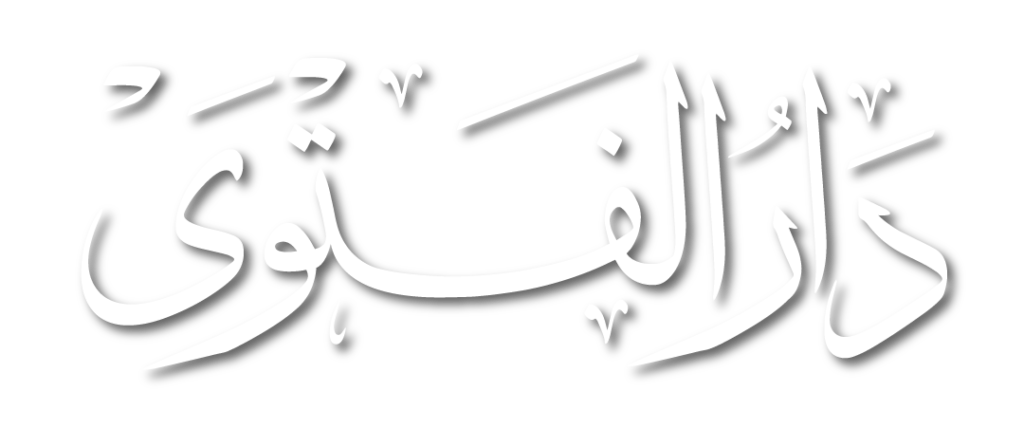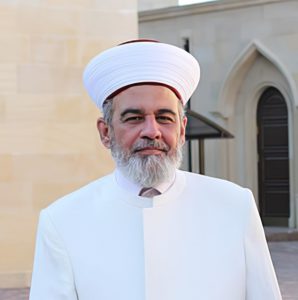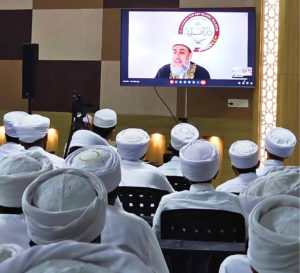Allāh Exists Without A Direction Or A Place
The claim of some ignorant people that Allāh resides above the throne where there is no place is a claim without a proof because there is a place above the throne as is proven by the saying of the Prophet peace be upon him narrated by Al-Bukhāriyy: When Allāh decreed the creation He created a book above the throne that states the signs of my mercy are more numerous than the signs of my punishment.”
The anthropomorphists of this era claim that there is no place above the throne and that the place is only below the throne. So they say to deceive the people “Allāh is above the throne without a place.” And sometimes they say “Allāh is above the throne where there is no place.” Some of them say “Above the throne is a non-existent place, so Allāh is above the throne where there is a non-existent place” as they claim and that is a saying without any evidence to it.
It has been narrated in the Hadīth that there is a book above the throne that says “Certainly the signs of my mercy are more numerous than the signs of my punishment.” This means that the things that are accepted by Allāh are more numerous than the things that are not accepted by Allāh, that is, the apparent signs of mercy are more numerous than the signs of punishment and they came into existence first. The angels are among the signs of mercy and they are more numerous than raindrops and tree leaves and animals and birds and beasts and the angels were created before the humans and the jinn. Paradise is among the signs of mercy and it is larger than Hellfire by thousands of times and it was created before Hellfire and Allāh accepts Paradise because it is the abode of those who He accepts.
Therefore it is not religiously nor intellectually impossible that there be a place above the throne. Had it not been that there is a place above the throne then the Prophet peace be upon him would not have said about that book that it is raised above the throne and in another narration “it is there above honored above the throne.”
The linguists have confirmed that the term “”عند comes with the meaning of other than the dwelling in a place. It comes also with the meaning of time and with the meaning of judgment and with the meaning of honoring. Therefore the term عند in the Hadīth comes with the meaning of honoring that place that the book is in.
The Hāfidh narrator of Hadīth Waliyy Ad-dīn Abū Zur^ah Ahmad the son of ^Abdullāh Al-^Irāqiyy said “And the saying of the Prophet peace be upon him ‘and it is there above the throne’ has to be interpreted to mean other than the literal meaning of the term عنده because it means in the presence of something and Allāh is clear from being attributed with being established and with dwelling and with being in a direction.” Therefore the usage of the term عند is not with the meaning of dwelling in a place rather it is with the meaning of honoring, that is, the book was put in that place that is honored by Allāh. Just as it is mentioned in the verse
{فِي مَقعَدِ صِدقٍ عِندَ مَلِيكٍ مُقتَدِرٍ} [سورة القمر]
that states “in a place that is accepted by The Creator attributed with perfect power, it is used with the meaning of honor and high status and not with the meaning of distance or touching.
Just as it is mentioned also in the verse
{عِندَ ذِي العَرشِ مَكِين} [سورة التكوير]
It means having a high status to The Creator of the throne. Likewise in the verse informing about the saying of Āsiyah
رَبِّ ابْنِ لِي عِنْدَكَ بَيْتًا فِي الجَنَّةِ(11)﴾ [سورة التحريم]
this means in an honored place.
She is Āsiyah the daughter of Muzāhim, she believed in Prophet Moses and so Pharaoh tortured her with the four stakes and so she said while being tortured O Lord grant me a home in Paradise an honored place because Allāh The Exalted is clear from being attributed with the place and so she expressed that honored place by saying عندك
Learn dear brothers and teach others and do not be shy to say to the one who sends you religious judgments “Who did you learn this from directly and how?” Let that person clarify his chain and who he took it from among the well known trustworthy teachers who accurately convey the religious knowledge, or let the person say I am the one who wrote such and such. Many people destroyed themselves and they destroyed others by getting involved in misguided things because they lust for putting themselves above their peers and so they spread everything that comes into their hands without verification or fact-checking. They do not divulge where they got those judgments from nor from where. Sometimes they say “from our teachers” and this is route has its doubtful aspects because the habit of the people of knowledge is to mention their chains of narration from where they convey their knowledge. It occurred with me that I asked a person “Where did you get this from?” And so he replied “From so and so.” I said to him “You got it from him directly?” And he replied “No!” Then it became clear that the saying was not correct. I remind you and myself with the saying of Ibn Mubārak “Certainly, this knowledge is religion and had it not been for the chain of narration then anyone would say anything.” Therefore do not be shy about asking for the chain of narration, and this applies to everyone, therefore beware of those who exclude themselves from this rule.





